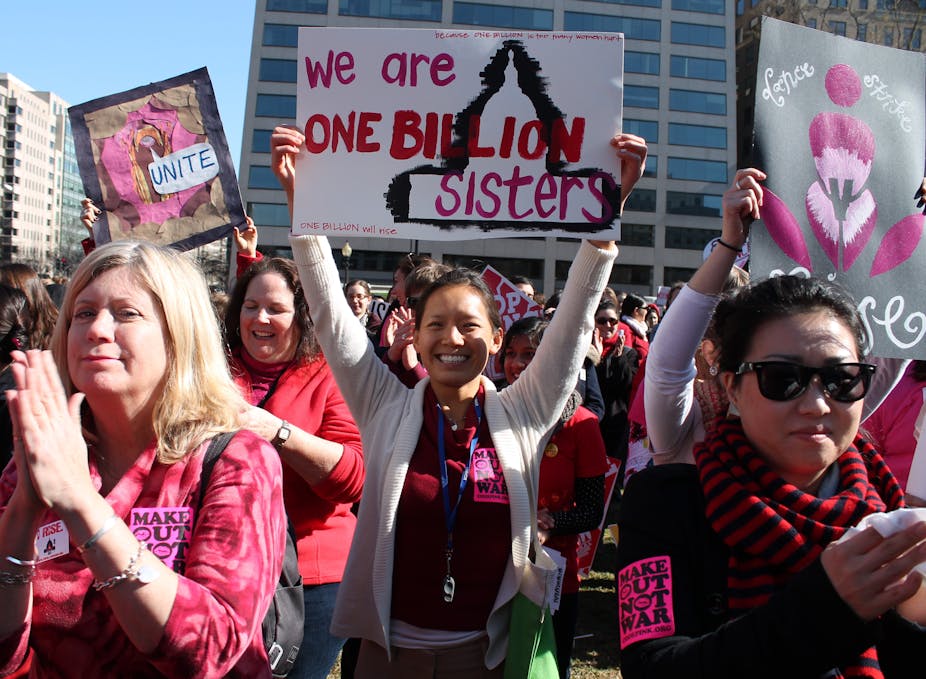Feminists: we’re always complaining about something aren’t we? Sign my online petition, withdraw this, that and the other, retweet this, boycott that, and don’t even bring a Nestle product into the office never mind the home.
This week feminists have mainly been targeting Irish online betting organisation Paddy Power. Domestic violence survivor Jean Hatchet, supported by more established feminist campaigns such as Karen Ingala Smiths’s “Counting Dead Women” campaign, set up a petition via change.org and, within four days, obtained more than 125,000 signatures, 5,000 complaints to the British Advertising Standards Authority (ASA), and additional ones to the Advertising Standards Authority of Ireland.
Jean Hatchet was angered by Paddy Power giving odds for (and advertising on) the outcome of the Oscar Pistorius murder trial. The South African Paralympic medal winner is currently standing trial for the murder of his partner Reeva Steenkamp. He admits shooting her, but alleges he mistook her for an intruder. A Paddy Power advertisement featured his face on an Academy Award statue with the words “It’s Oscar Time. Money Back If He Walks. We will refund all losing bets on the Oscar Pistorius trial if he is found not guilty.”
Jean Hatchet petitioned the CEO of Paddy Power, Patrick Kennedy, stating:
Paddy Power, please remove your offensive betting on the outcome of the Oscar Pistorius trial and donate any profits so far to a women’s charity fighting violence against women.
A quick win was obtained. The ASA had never received this number of complaints before, and they took the unusual step of withdrawing the advert from all national advertising while they conducted their investigation. Soon after, the bet itself was withdrawn.
Why is this important, and why do feminists instigate campaigns like this one?
Feminists understand male violence against women to be part and parcel of gender inequality as a whole: violence against women is both a cause and a consequence of gender based inequalities that operate across the world. For this reason, ending violence against women was one of the seven key demands of the Women’s Liberation Movement conferences in the 1970s. This “cause and consequence” argument has been adopted by key international organisations, including the United Nations.
For most feminists, the label “feminist” goes beyond a job, a role, or a position. It is integral to the way they live their lives. It is an ethos that links the personal to the political, and vice versa. Virtual organising through online petitions, Twitter, and other social media has made feminist campaigning easier in many ways, taken it to a wider audience, cheaper, and made it 24-hour. (Though as I have written before, it has also added new difficulties).
Unfortunately, both the cause (gender-based inequality and other forms of inequality, including racism and classism) and the consequence (gender-based violence and abuse) are all around us, day in day out. So it figures that when we go to the shops and see the “boy toys” and “girl toys” stacked separately, we start a campaign, just like we do when we see women being murdered week in week out, but being treated as isolated incidents (Counting Dead Women). If we are on our way on a night out and sexually harassed on the tube (Everyday Sexism). When we see overtly victim blaming news reports in the media (Ending Victimisation & Blame). We do something about it. We start campaigns. We try to change things.
The Pistorius case has demonstrated this spectacularly. Feminists had previously turned to twitter to vocalise their concern about how the media were reporting the case. The hashtag #HerNameWasReevaSteenkamp was used in response to media reports that were referring to her only as “his girlfriend”, or “model”. The Sun and the Daily Star, for example, both showed a full-page image of Reeva Steenkamp in a bikini, but referred to her in their headline text only by her position of “lover”.
Whether our targets are relatively small things (an advert, a bet, not using a woman’s name, a toy category, a term in a news headline, a “flirtatious” cat call in the street) or the murder, rape or “honour” killing of women, they are linked. If we separate the causes and the consequences by compartmentalising the “serious” from the “everyday”, the “funny” from the “killjoy”, the links are broken and the invisibility of male violence against women is maintained. Online organising is allowing these links to be made more and more. On this International Women’s Day, feminist killjoys: come one, come all – we’re changing the world one campaign at a time.

